Is Stevia the Best Sweetener on the Market?
Stevia is a natural sweetener that is growing in popularity, but is it the best sweetener on the market? The correlation between sugar consumption and the rise in diet related health concerns has put a spotlight on table sugar. Only a few decades sugar lovers were most concerned with adverse health effects on weight and diabetes from sucrose consumption.
Sugar alternatives are found in a colorful variety of packets and are hidden in long lists of ingredients in processed foods and beverages. One non-nutritive sweetener product growing in popularity is stevia. Health advertisements for stevia products claim that this sweetener does not stimulate the same response in blood sugar and insulin levels as does traditionally used sucrose.
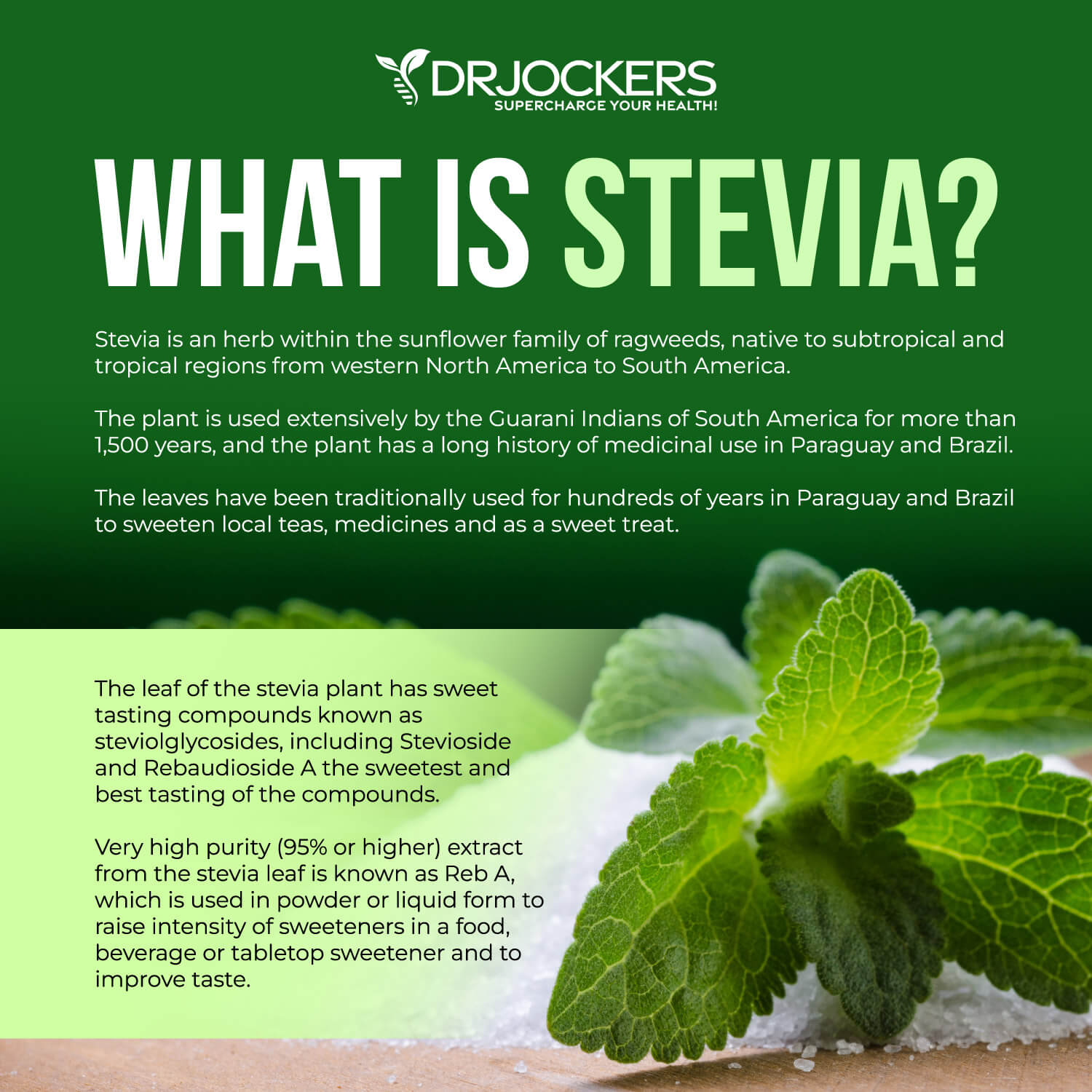
Why Not Other Sweeteners?
Due to diet trends limiting sugar intake, food manufacturers were quick to find alternatives for the health conscience in order to regain profits. As a result, the market carries a variety of zero calorie sweeteners designed to avoid the waist line. Not only is weight and diabetes the primary issue with sugar consumption today, but people have yet another problem: What is the difference between all of these sugar substitutes?
Consumer awareness for foods that contribute to weight gain may always be of an immediate concern and is a major factor that has contributed to the overflow of sweeteners on the market. Sorry to be the bearer of bad news but the theory that sugar alternatives do not cause weight gain has been well supported otherwise.
One simple reason may be a result that our tasting palette is overstimulated by the extreme potency of artificial sweeteners. When we consume natural sugar found in fruit or vegetables, our desired taste previously perceived cannot be simulated leading to more cravings.
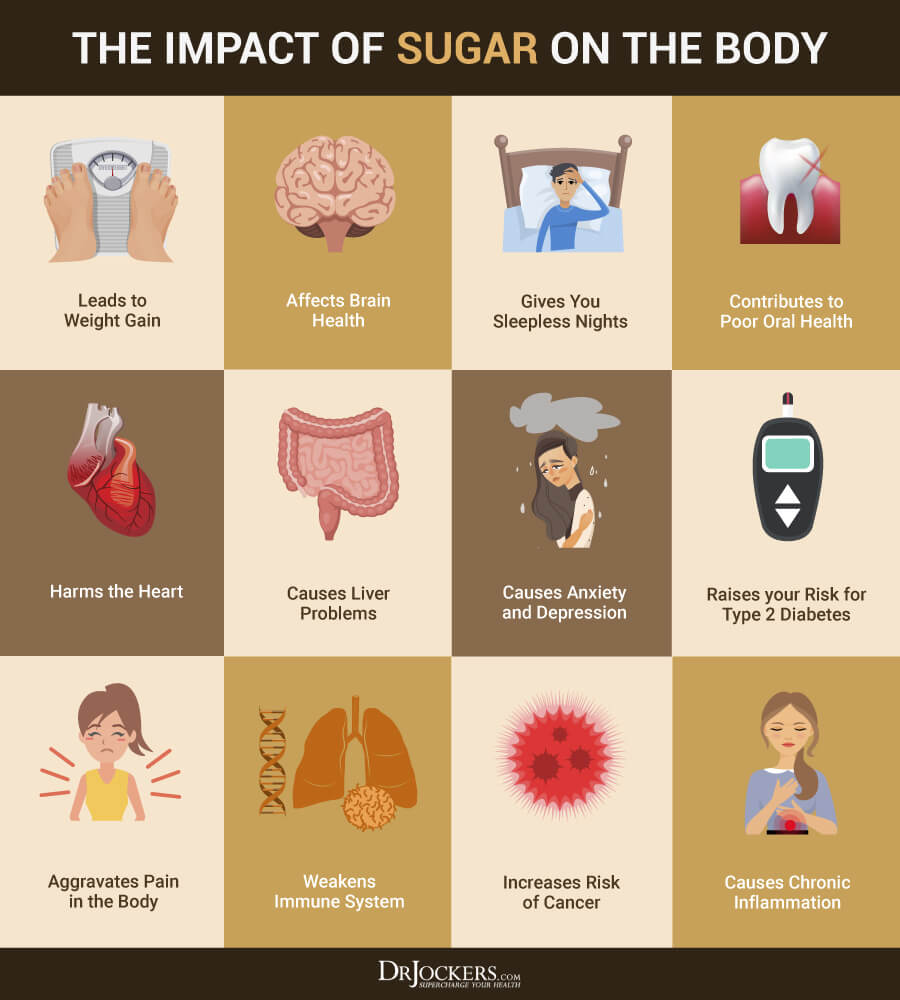
Sugar and Your Internal Thermostat:
Homeostasis is the internal control and regulation of body mechanisms to maintain an optimal environment for health and living. Most sweeteners are designed so that the body does not recognize and treat the food additive as it would sugar even though the sweet taste on your tongue relays to your brain that you are indeed consuming sugar.
When your brain signals to carbohydrate receptors that sugars are on the way but they never come, the receptors create a pathway of signals back to the brain complaining that they want sugar! Individuals who consumed sugar alternatives are therefore more likely to consume more calories in the long run when they are overcome with these cravings.
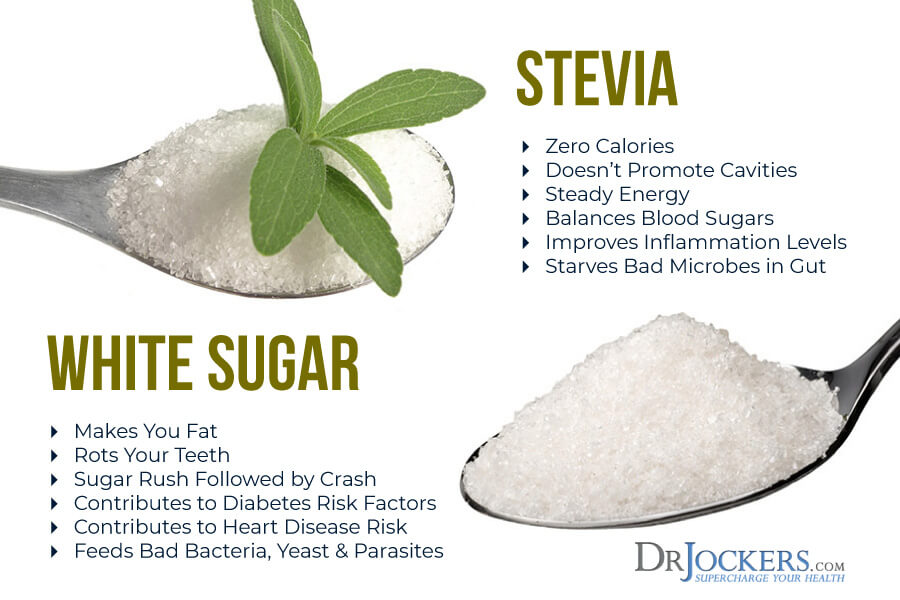
Common Sugar Substitutes to Avoid:
The National Toxicology Program (NTP) or Federal Drug Administration (FDA) does not currently impose any limitations of the following sugar substitutes as food additives:
Saccharin: Found in products like Sweet and Low®; Sweetness is up to 700 times more potent than table sugar; Despite studies linking saccharin to cancer, allergic reactions, irritability and muscle dysfunction, the NTP removed this sugar alternative from the list of potential carcinogens because of “limited” research in humans.
Aspartame: Found in Equal® products; Up to 220 times sweeter than sucrose; Approved by the FDA since 1996 for human consumption; Metabolized in body and poses major health concern to individuals with PKU (phenylketonuria) whom cannot break down a specific amino acid; Independently supported studies link aspartame to numerous health consequences such as memory loss, anxiety, mood disorders, cancer, headache, joint pain, increased hunger and possibly weight gain.
Acesulfame potassium: Approved since 1988, the FDA does not require testing on long term exposure and health risks remain a concern; Predominant additive in beverages including Coca-Cola® products; Contains carcinogen methylene chloride linked to cancer, depression, nausea, and adverse liver conditions.
Sucralose: Found in Splenda®; Up to 600 times sweeter than sucrose and does contain calories; Approved for human consumption since 1999; Marketed “natural” sweetener with ending suffix “-ose” misleads consumers into believe the sugar carbohydrate is purely taken from nature;
Processed with several chemicals including chlorine, and preserved with chemicals including maltodextrin and dextrose; Linked to gastrointestinal problems, mood changes, and allergy symptoms such as hives, itchy eyes, coughing and inflammation; Especially not recommended for consumption by individuals with diabetes.
Neotame: Aspartame related chemical approved for individuals with PKU since 2002; Up to 13,000 times more potent than sucrose; Very limited studies on safety and consequences to exposure. (19, 20)
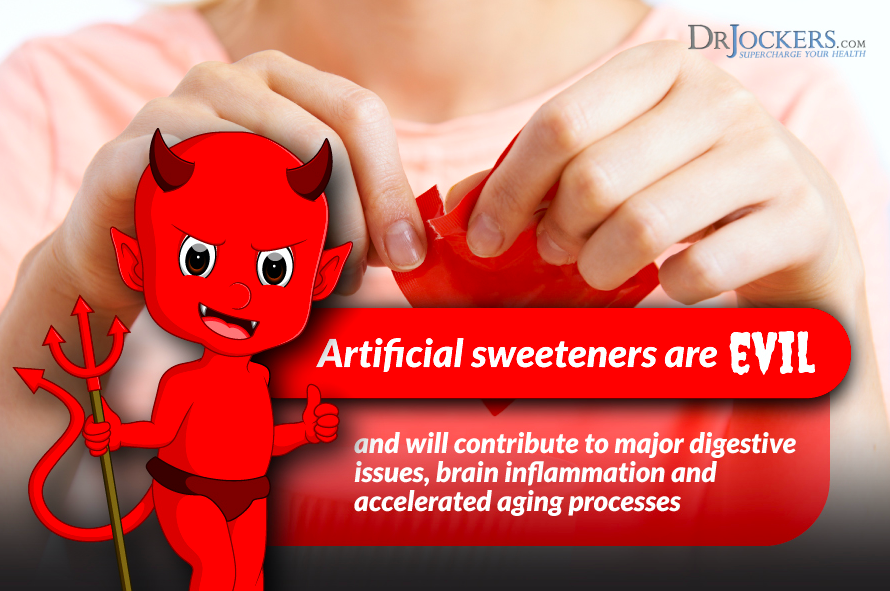
Why Stevia?
Stevia is called by the native Indian tribe in Paraguay as “Kaa he-he” which means “sweet herb”. This local herb is believed to have been used for centuries by locals from a sweetener in teas to its inclusion in medicinal treatments.
The Japanese were the first to purify stevia extract in the 1970s and have since used stevia in many of their fermented foods. Stevia is now cultivated in several countries including the United States, China, Brazil and Mexico. It may also be purchased in liquid, powder or tablet form and is found in both food and dental hygiene products. (3)
The perceived sweetness in stevia is attributed to the glycoside content in the plant which is a sugar molecule that makes up anywhere from 4-20% of the dry plant (3). Two of the most desired glycosides extracted from the stevia plant are:
- Rebaudioside A: Many prefer the taste of this specific glycoside because it is not as potent tasting as steviosides.
- Steviosides: Second desired sugar component of stevia with a familiar liquorice taste.
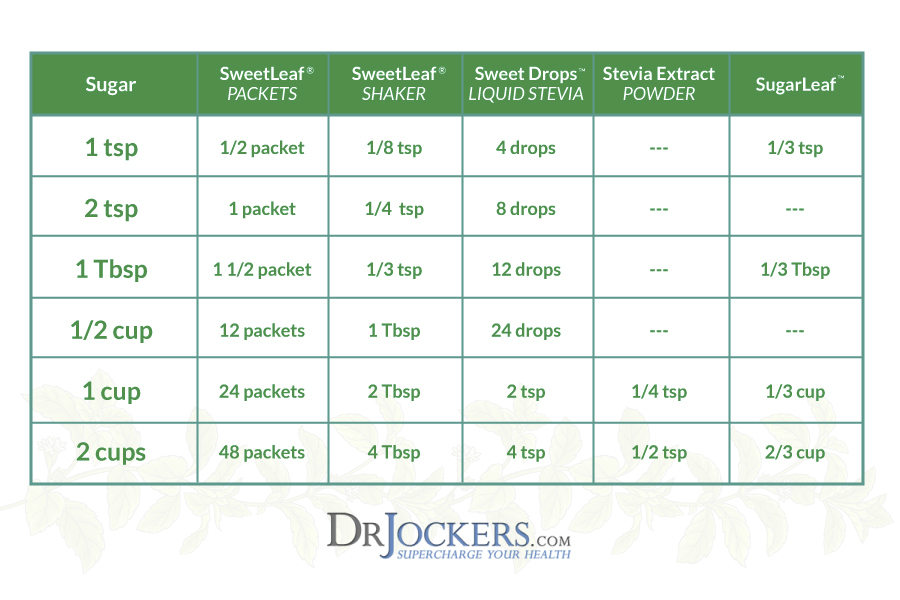
Health Benefits of Stevia
Stevia contains zero calories and is up to 300 times sweeter than sucrose which makes stevia an excellent sugar substitute. This “miraculous Paraguay herb” may be called such because of its therapeutic properties in controlling diet related diseases such as type-2 diabetes, cancer prevention, weight control and overall human health. (1,2)
Scientists have identified general health benefits in individuals that consume products derived from stevia. Perhaps the best sweetener on the market, stevia does not appear to have the negative health risks associated with consumption as do other sugar alternatives.
While researchers are still working towards identifying how the body utilizes all components contained in stevia, what is understood clearly benefits human health.
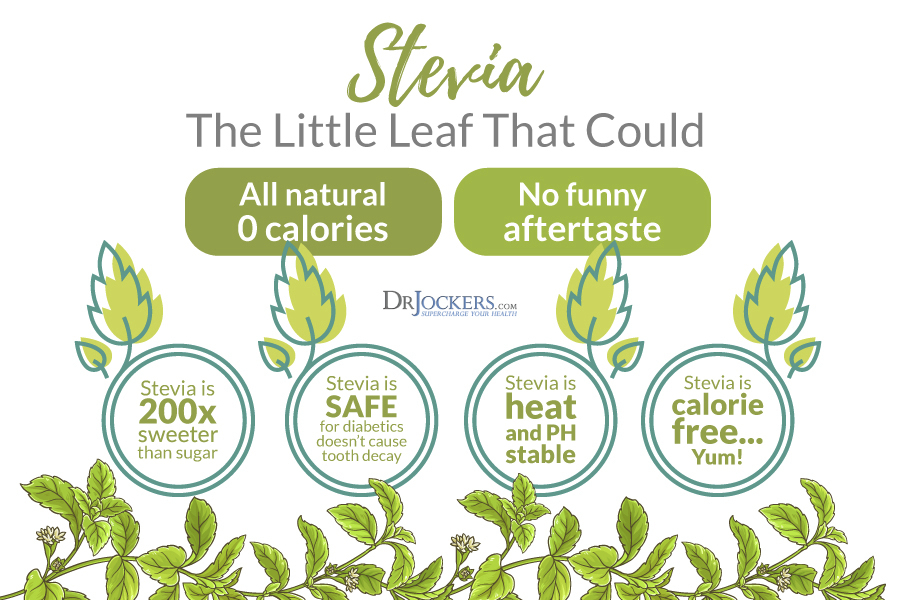
Anti- Hyperglycemic Agent:
Some research has found that stevia acts as an anti-hyperglycemic agent, or high blood sugar antagonist, because of its ability to lower glucose levels by up to 35% in healthy individuals and approximately 18% in patients with type-2 diabetes (1). This benefit is of major interest because of growing concerns for increased rates of obesity and type-2 diabetes linked to added sugar consumption in foods.
Data from the National Health and Nutrition Examination Survey suggests that some individuals in the United States alone consume more than 16% of total caloric intake from added sugars. According to the USDA’s Dietary Guidelines for Americans, 2010, added sugar intake should not exceed 5% to 15% of total caloric intake. (14)
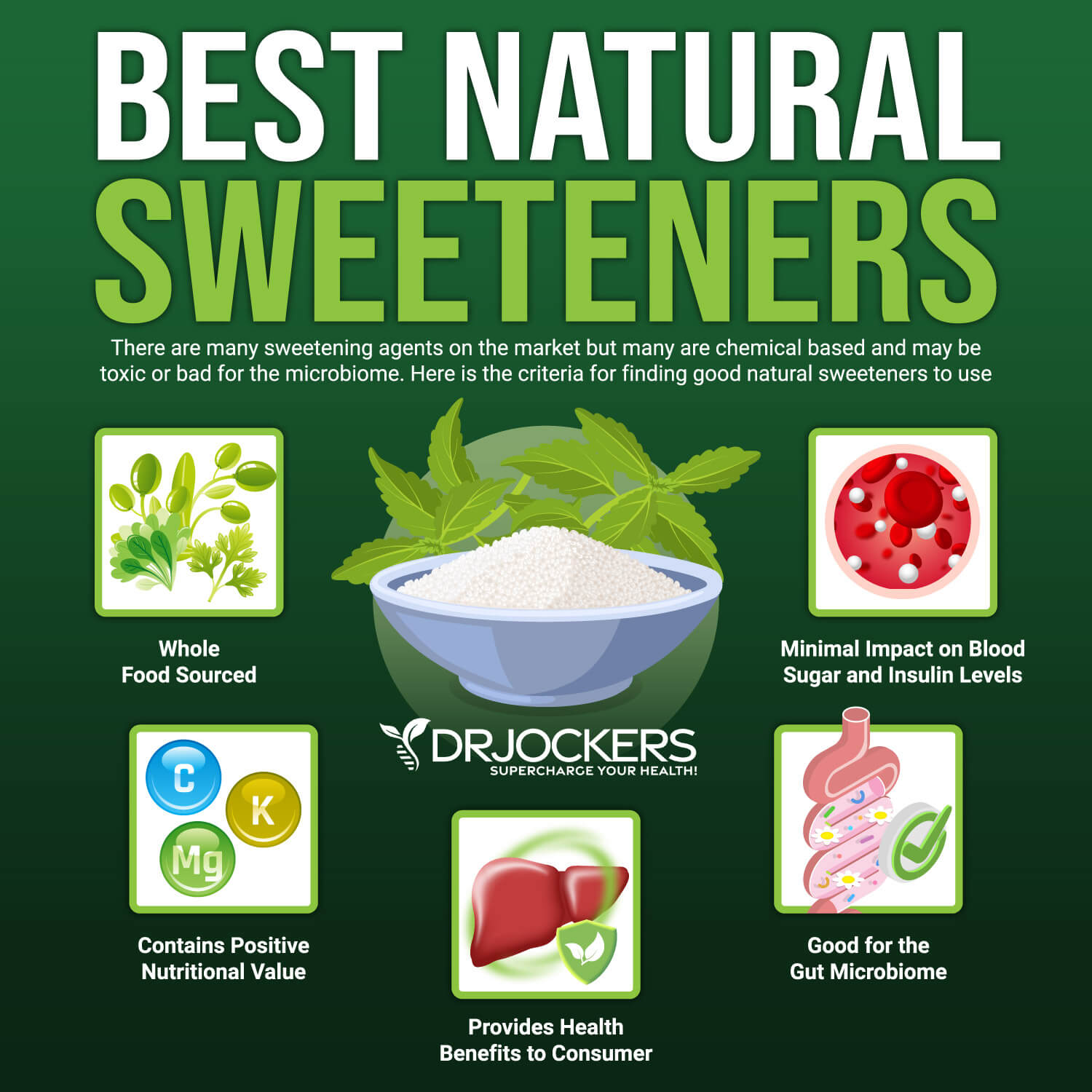
Stevia Breaks Down Sugar and Fat:
A 2010 study examined the effects of stevia to other sweetener products (4). Healthy individuals who consumed stevia had significantly lowered postprandial glucose levels compared to those who consumed sucrose.
In other words, the body appeared to stabilize blood sugar much more efficiently than traditional table sugar following food intake. Lower insulin levels were also measured in individuals who consumed stevia compared to those who ate aspartame and sucrose.
A 2015 report, yet to be published in Food and Chemical Toxicology, provides greater support that stevia products reduce insulin resistance not only by enhancing insulin secretion but also by improving both glucose metabolism and the breakdown of fat and bile acid which aids in weight control (10).
The wave like effect of repeating spikes in blood glucose followed by a dramatic drop leads to insulin resistance causing diabetes. Stevia may therefore be an excellent sugar alternative for individuals with metabolic conditions such as diabetes, hyperglycemia or those with energy imbalances and problems controlling weight.
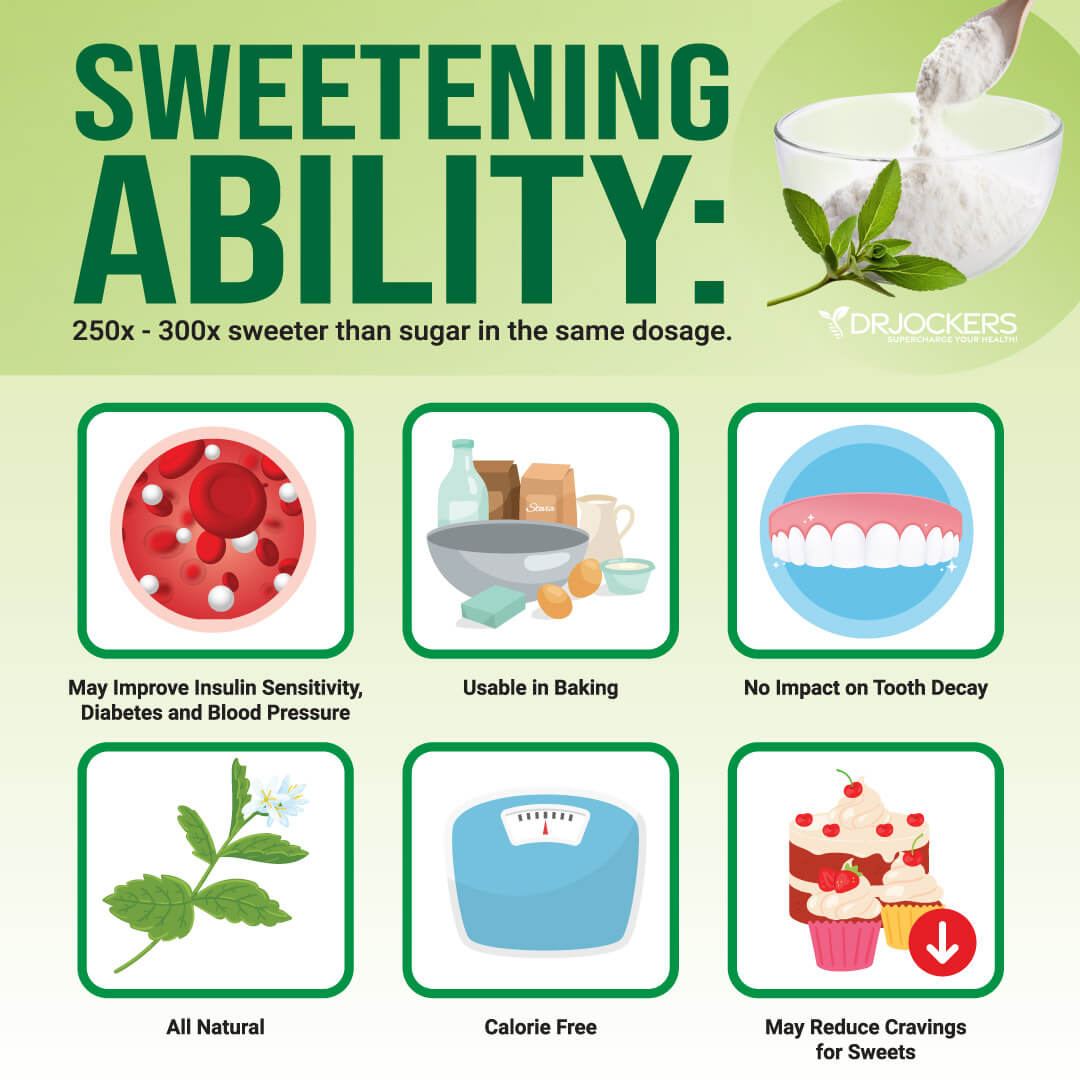
Antimicrobial
Ayrvedic medicinal treatment in India has utilized herbs for medical purposes for thousands of year (6). Stevia extract is now found as a sweetener substitute in toothpastes and mouthwashes because it does not erode dental enamel like sucrose does.
In 2014, researchers tested this historical approach to preventing tooth decay from analyzing the common bacterial activity of Streptococcus mutans and Lactobacillus acidophilus in the mouth (1). Although researchers determined that stevia did not achieve the desirable effects at inhibiting the growth of bacteria as do other chemical agents or antibiotics, the study did measure a slight reduction in microbial activity.
While awaiting further studies to examine the effects of varied concentrations of stevia on periodontal pathogens and its efficacy at preventing dental decay, results suggest that no harm will likely come from the use of dental hygiene products containing stevia.
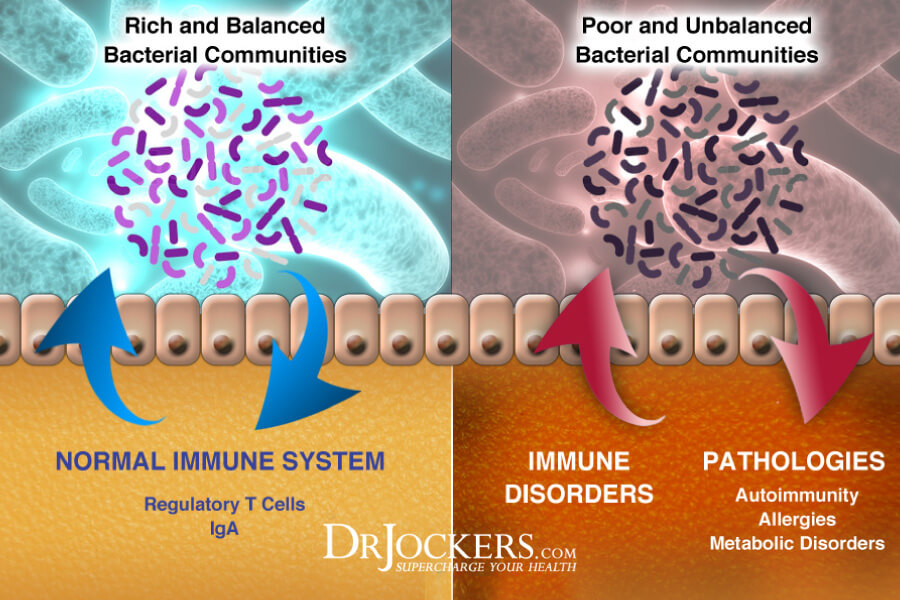
Antioxidant:
The body is constantly combating free radical damage caused from oxidative stress resulting from the natural response of maintaining homeostasis, healthy exercise habits or from detrimental health habits such as smoking.
Antioxidants protect the body by combining with free radicals so that these unstable molecules do not react with other cells disrupting body processes and function. The stevia plant has been measured to contain high quantities of the following natural antioxidants:
Polyphenols: Examples of antioxidants found in stevia are α-tocopherol (vitamin E) and L-abscorbic (vitamin C) acid which prevent against disease, cancer and overall health degeneration.
Flavonoids: Antioxidants commonly found in fruits, vegetables and teas. These compounds also help to defend the human body from aging, injury, inflammation and neurodegenerative illnesses like Parkinson’s disease.
Vitamins & Minerals: Stevia contains many essential minerals and vitamins including potassium, calcium, iron and folate which help regulate and maintain metabolic processes. The antioxidant-like vitamins and minerals it contains are magnesium and zinc which play various roles in ridding the body of toxins. (3, 16)
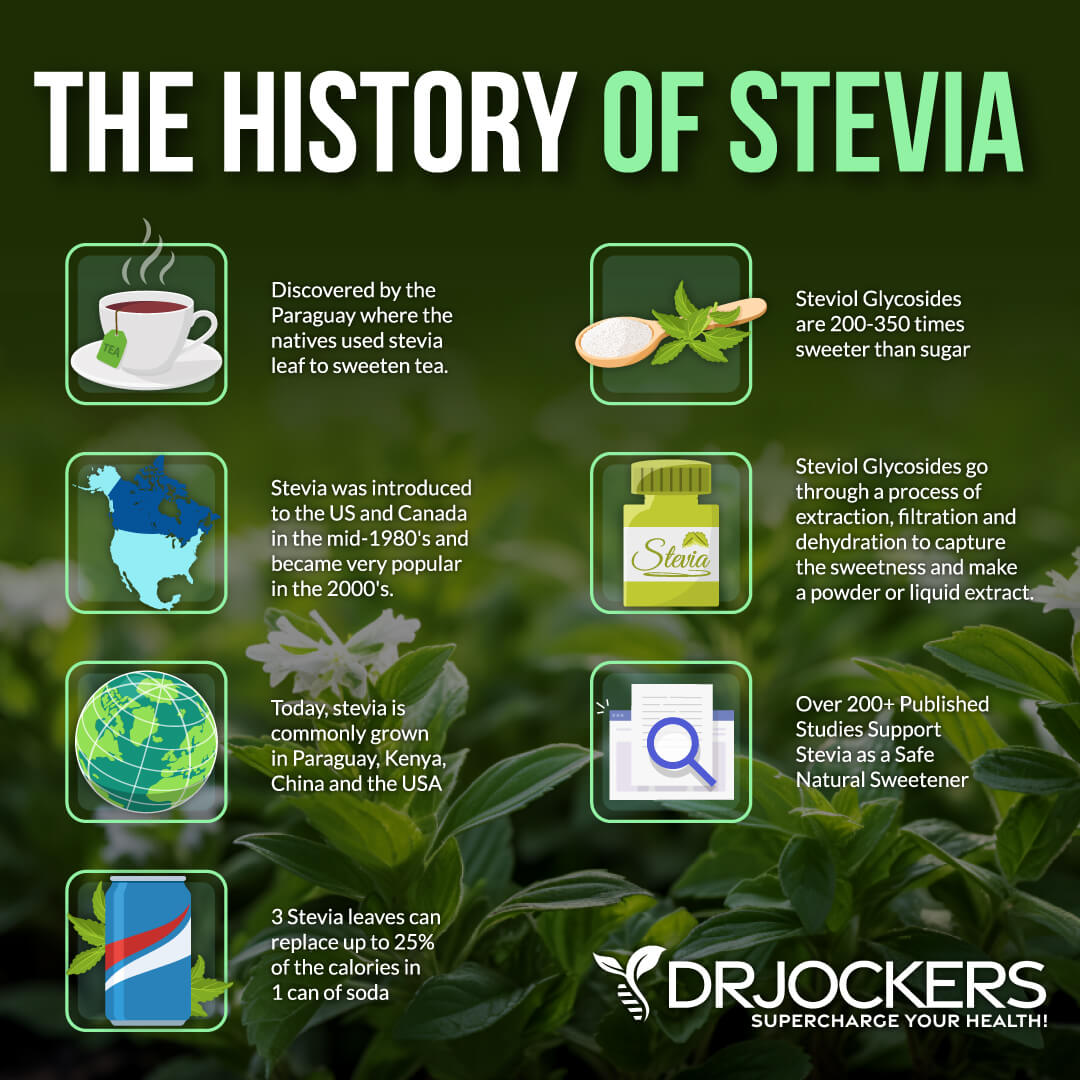
Anti-inflammatory & Anti-Tumor:
Some studies have found that the phagocytic function of cells, referred to as cellular eating because a cell will completely engulf and process particles, aids the immune system in protecting the body from potential threats when stevia is consumed (1). Two water-soluble compounds contained in stevia, chlorphylls and xanthophylls, have also been named as the reason why stevia exhibits anti-inflammation and cancer protective properties.
Chlorophylls and xanthophylls have been concluded to not only protect the body from the effects of carcinogens linked to numerous health concerns and disorders, but these components have actually been shown to limit tumor promoting cell growth (15).
Anti-Hypertensive Properties:
Stevia has been shown in individuals to promote heart health properties including a reduction in total cholesterol levels, strengthened blood vessels, and blood clotting promoting factors (3). The process by which stevia has this cascading effect on cardiovascular benefits requires further analysis.
Effective at combating high blood pressure, the steviosides may be responsible in regulating blood pressure and heart rate. A possible mechanism in achieving this benefit may be a result of its diuretic capabilities. Excreting excess water also rids the body of sodium. Individuals with bradycardia, or a slower than normal heart rate response, may benefit from these anti-hypertensive properties of stevia. (1)
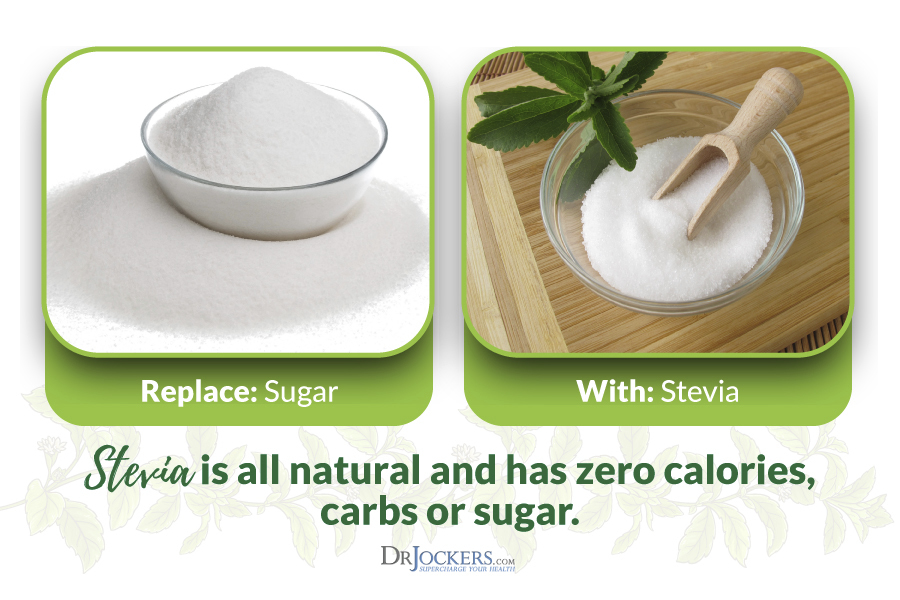
Safety Concerns:
The support of health claims and denial of safety concerns resulting from studies must be tightly scrutinized. Many studies are financially funded by companies such as Cargill®, which is the manufacturing company for Truvia® Stevia Leaf Extract. Other individuals involved in the research team for stevia actually work for the Coca-Cola® Company which is a partnership with Cargill®. (13)
Food manufacturers gain the unfair advantage when scientific research is limited in regards to any food ingredient and its impact on human health. If researchers cannot reasonably identify the metabolic pathways and interactions that stevia exhibits in the body, the health hazards are also unclear and the consumer is at risk.
Genotoxicity- DNA Damage:
DNA damage is one possible health risk posed by researchers. Long term human studies are necessary to determine how stevia is metabolized in the body and if metabolites produced damage chromosomes which contain DNA. A study conducted in 2008 determined that glycosides contained in stevia are broken down into a compound called steviol. Concentrations of steviol examined in rats were measured in the intestinal tract for an extended period of time.
What concentration of steviol did not linger in the intestines appeared to recirculate back into the liver where stevia was originally broken down or excreted in fecal matter. Studies performed in rats remain clinically insignificant because of major physiological differences than exhibited in humans. (13)
Birth Control Properties of Stevia
Native Guarani Indians in Paraguay are believed to have used stevia leaf as an oral contraceptive (11). Scientists believe that previous studies were flawed or conclusions were misleading in those cited to indicate adverse health effects on male and female fertility (12).
Whether stevia has contraceptive properties or not remains a topic for much more controlled research and future discussion. Until all known health hazards of stevia on fertility are determined, an individual that may be pregnant, nursing or trying to conceive might decide to err on the side of caution and limit stevia intake.
How to Shop for Stevia:
Where there is a demand for a product therein also contains variation. Unfortunately, the demand for stevia today is no different and provides food manufacturers another avenue to increase profit while misguiding consumers. The following common stevia derived products on shelves are listed to help you become an educated consumer.
Stevia in the Raw®: Stevia leaf extract is second in ingredients following dextrose. If dextrose is a caloric sugar typically sourced from genetically modified corn, how is it that the product claims to have zero calories? This product may not be the best source of stevia.
PureVia®: The primary ingredient listed is dextrose (7). Nope, 12 calories + 0 calories still does not equal 0 calories.
Truvia®: Ingredients contained are erythritol, stevia leaf extract and natural flavors. Natural flavors are classified as any spice “used to enhance the taste of food” and can be chemically altered. If a chemically altered food product is what you desire to consume, the erythritol content alone in Truvia® will meet your demands.
The Truvia website states that erythritol is a naturally occurring sugar alcohol. Although this is true and only begs further discussion about the effects of this sugar on human health, erythritol is highly processed with synthetic chemicals and the validity behind their “natural” health claim is a debate only to be left up to a court of law…or you: the consumer (15, 18).
Wholesome Sweeteners® Organic Stevia: Organic stevia advertises that its products are non-GMO, gluten-free and contains no artificial ingredients. Any individual might surely assume the organic product will be a better choice. Actually, the highest concentrated ingredient is organic agave inulin which has been linked to insulin resistance. Following organic stevia extract, silica is the third listed ingredient.
Silica is an element required by the body for bone formation and health. Although it is naturally occurring in drinking water, plants and unrefined whole grains, synthetic silica is also an approved food additive. Incorporated in products to aid in long term preservation, health consequences of silica consumption has also been limited in study. Scientists do know that silica is not readily digested or absorbed in the gastrointestinal tract and may have carcinogenic promoting factors in the intestines or other organs (9).
SweetLeaf®: Marketed as the “world’s best tasting stevia,” SweetLeaf® sweet drops contain only stevia leaf extract and naturally sourced plant inulin or fiber. SweetLeaf® only provides information that the sweetener is sourced from South America and other sources where cultivation practices heavily rely on toxins and pesticides. Although this product is not organic, it SweetLeaf® products seem to be a reasonably good consumer buy. (17)
Trader Joe’s® Liquid Stevia: Ingredients contained are de-ionized water, certified organic stevia extract (stevia rebaudiana) (leaf) and 11% organic alcohol. No added chemicals and pronounceable and recognizable ingredients make Trader Joe’s® Liquid Stevia a smart choice.

Remaining an Educated Buyer
Diet trends might come and go but health concerns seem to remain unfailing. Evidence supporting stevia consumption for health benefits certainly seems promising especially when compared to other sweeteners on the market.
Until researchers have a better understanding of all human health consequences, consumers should remain skeptical to claims made in the food industry. Grocery shoppers and diners can now answer the question, is stevia the best sweetener on the market? Surely the answer is yes.
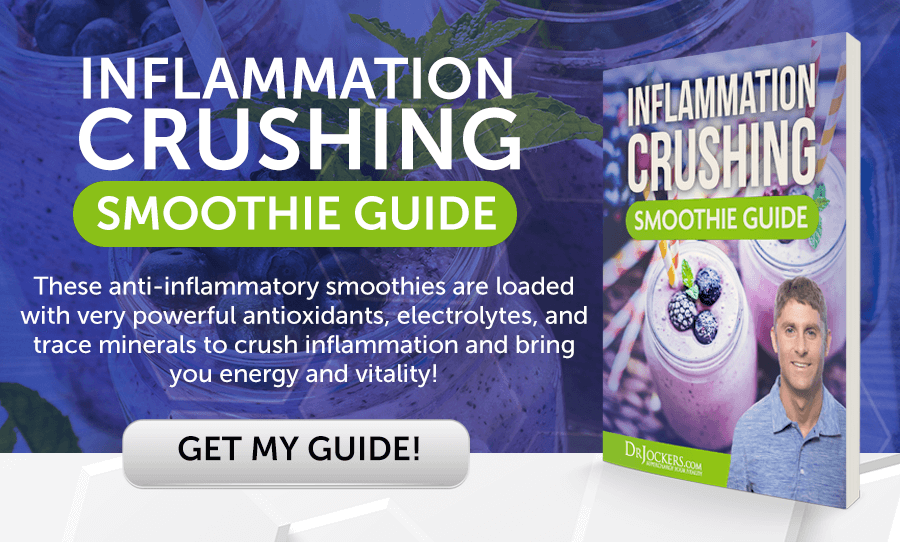 Inflammation Crushing Ebundle
Inflammation Crushing Ebundle
The Inflammation Crushing Ebundle is designed to help you improve your brain, liver, immune system and discover the healing strategies, foods and recipes to burn fat, reduce inflammation and thrive in life!
As a doctor of natural medicine, I have spent the past 20 years studying the best healing strategies and worked with hundreds of coaching clients, helping them overcome chronic health conditions and optimize their overall health.
In our Inflammation Crushing Ebundle, I have put together my very best strategies to reduce inflammation and optimize your healing potential. Take a look at what you will get inside these valuable guides below!
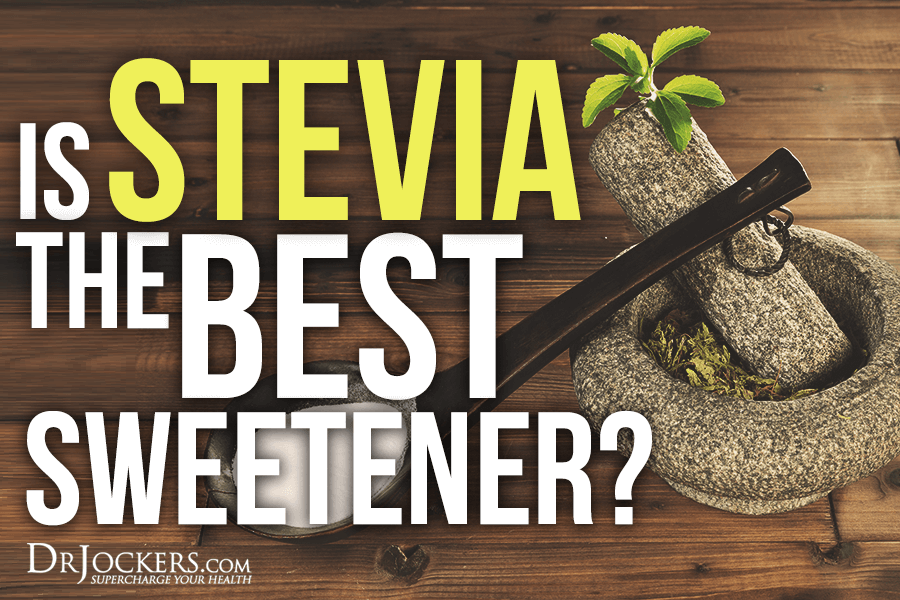





I’m taking a powder of exogenous ketones which is sweetened with stevia and monk fruit. I’m trying to figure iut if stevia and monk fruit raise insulin levels? In other words, if I am breaking the fast and moving out of ketosis by taking this powder?
left me a bit confused since the indications it gives about insulin don't look very good despite the overall tone of the article which seems supportive of stevia.
The only references to insulin that I saw in the article were the following two sentences:
“Lower insulin levels were also measured in individuals who consumed stevia compared to those who ate aspartame and sucrose”
According to my understanding this sentence does NOT mean thay stevia doesn't raise insulin levels but only that it does so less than aspartame and sucrose. (In other words, it could still be raising insulin levels but just less than adpertame and sucrose)
And in the paragraph below that it says
“Stevia products reduce insulin resistance.. by enhancing insulin secretion”
I am not too sure if I understand this sentence. I thought that in keto we want to reduce insulin secretion NOT increase it, no? What exactly am I missing or misunnderstanding here?
Moreover, the references at the end of the article led me to reach another study https://www.ncbi.nlm.nih.gov/m/pubmed/27956737/?i=2&from=/20303371/related which says thst there is NO DIFFERENCE in glucose and insulin response between stevia, monk fruit and sucrose….
So I am left with more questions than answers after reading this..
Hey Daniel – yes anything with a sweet flavor will elicit some sort of an insulin response and this can differ based on the individual. Fortunately, exogenous ketones also blunt the insulin response so while taking exogenous ketones isn’t technically fasting it will have the most mild impact on your insulin levels.
Everyone touts Stevia, but those with thyroid cannot take it and there are many side effects with bloating, nausea and fatigue being some of the most reported.
Actually, most people with thyroid issues do great with stevia. However, a very small percentage may have a food allergy or sensitivity to stevia. In this case, I recommend monk fruit. https://drjockers.com/8-health-benefits-monk-fruit/
I have hyperthyroidism and use Swanson brand certified organic stevia extract(powder form in packets) and seem to do well with this product. I purchase when on sale.
Ok great if you are doing well with it!
I don’t see the brand you showed in the video of the chocolate avocado truffles recipe listed in your evaluation of brands of Stevia. I couldn’t see the whole name of it and wondered what it is called and where it can be purchased. I figured you liked it since you were using it in your video demo for the recipe.
Yes we like the Sweet Leak brand here: https://amzn.to/3TZiEHX
Hi,
Do you and your family use Trader Joe’s stevia?
I first want to thank you for your info on ileocecal valve. I am a retired wholistic nutritionist from the ’80s. ’90s and I was suffering pain. Your info was excellent. I also have abdominal adhesions from 45 years ago 3 ab surgeries which exacerbated the pain. But now I want to inform you of the best natural stevia from Sunrider Chinese website. It’s called Sun Nectar and the only ingredients are whole leaf stevia (it’s brown in color) and Chrysanthemum and water. Totally unprocessed. I was a distributor for this company and have been using it ever since. In those days before FDA ok’ed it but only as a skin tonic. Finally it was authorized as food. I have tried the bleached processed stevias on the market…White is not right…so I urge you to check it out. You don’t have to be a distributor to buy it. Love your website with all the visuals so people can see and read. Oh also I have been on a liquid diet for 8 days which is the only way to deal with scar tissue and ileo-cecal valve problems. Keep up the good work.
Amber Starr—(starwoman617@yahoo.com)
Hi, I have been using stevia powder in the past 30 years with no side effects. Lately using a Stevita a powder form brand, manufactured by Steviasoul, product from Brazil. I wonder if you may have data on Stevita that you may want to share with us. Thanks.